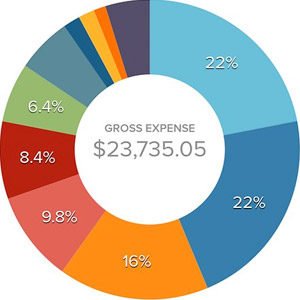Small Business Sales Compensation: How to Pay for Performance but Not Over Pay

If one had to generally summarize the role of a sales compensation plan, it would be to serve two purposes. Firstly, it provides and communicates a framework for a sales rep to understand what is expected of them and what they will get (monetarily) for their efforts. Secondly, the compensation plan provides a guideline to the CEO (and the CFO) as to the cost of sales for planning, budgeting and forecasting purposes. In a nutshell, what revenue is expected and at what cost (ROI).
There are numerous other roles that a comp plan plays and many will argue that the two that I highlight are not the key ones. However, the context is key here, which is: Small Business. Please read on and evaluate for yourself.
When I was at D&B (a medium size business) we had a good comp plan, I believe. Most reps liked it, some did not, which is a solid indicator that it struck the right balance (hey, if the entire sales force thought their comp plan was the cat’s meow, then I submit it’s probably weighted too much in favor of the rep and not enough for the company). The plan worked. It drove the right behaviours and outcomes.
More recently, I’ve had some significant exposure to a small company that had the following sales comp plan: “We’ll pay you a salary plus 15% for every dollar you sell.” That’s it. No quota. No minimums. No carrot. No stick. Guess what? The reps really liked it and no wonder because they ALWAYS got money for even the most paltry sales performance (they were a mediocre bunch to start with).
Basic Sales Plan for a Small Business
Companies like D&B generally have their act together regarding comp plans. Sadly, some (many?) smaller businesses don’t. But all they need is a basic plan to make things work for their reps and themselves. I propose the following basic sales plan for a small business who needs to better frame the expectations for a sales rep …and it’s quite simple:
- A sales rep gets a base salary PLUS the opportunity to earn more money through commissions.
- A sales rep is assigned a sales target (put a timeframe to it: annual, monthly, etc.).
- Minimum performance expectation: The rep is expected to generate a certain minimum level of sales and for that they get their salary. Expressed as a % of quota.
- Commissions: Only after they have reached their minimum, they start to earn commissions. The rep gets a commission for every dollar above their minimum.
- Commission kicker: Lastly, once the rep hits their full target, they are rewarded with extra commission dollars. This is called the commission accelerator or multiplier. The commission rate is factored up for every dollar above the quota.
Let’s do a few quick examples with the following conditions (if you don’t like numbers, skip to bottom) :
- Rep salary: $30,000
- Quota: $500,000
- Minimum performance before commissions: 80% or $400,000
- Commission rate: 15%
- Commission kicker above full quota: 1.5 or 22.5% (15% * 1.5)
Scenario #1: Rep generates $450,000 in revenue:
- (Performance minus minimum) times (commission rate) plus (salary) = total compensation
- ($450,000 – $400,000) * 15% + $30,000 = $37,500 total compensation or 8.3% cost of sales
Scenario #2: Rep generates $600,000 in revenue:
- [(Quota minus minimum) times (commission rate)] plus [(Performance minus quota) times (commission rate after kicker)] plus (salary) = total comp
- [ ($500,000 – $400,000) * 15%] + [($600,000 – $500,000) * 22.5%] + $30,000 = $67,500 total compensation or 11.25% cost of sales.
What is achieved with this plan/approach?
- The rep knows what is expected re: minimum performance
- The rep sees that there is escalating incentives to achieve minimums and quotas
- The company gets minimum performance for a base salary
- The company can correlate costs of sales to revenue
- The company can better performance manage their sales reps.
This approach is simple but effective and while not necessarily suitable to all companies, this can be a starter plan for those that don’t have anything right now and want to improve their sales performance.
The 5 point sales comp schema described above is available as an online tool or as an excel download at Sales Compensation & Commission Calculator.
I hope you found this helpful. Happy selling!
Geoff Vincent
 Do It Now! Essential Small Business Applications You Should Download Today
Do It Now! Essential Small Business Applications You Should Download Today 2015 Best Business Blogs To Hone Your Marketing Chops
2015 Best Business Blogs To Hone Your Marketing Chops 6 Best Cloud Accounting Solutions for Small Businesses
6 Best Cloud Accounting Solutions for Small Businesses 5 Things in Your Small Business That You Can Stop Worrying About
5 Things in Your Small Business That You Can Stop Worrying About
{ 16 Responses }